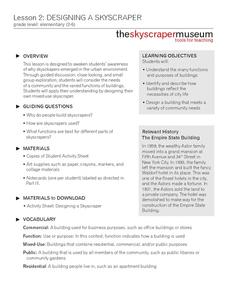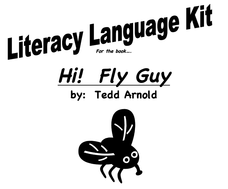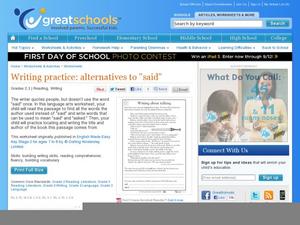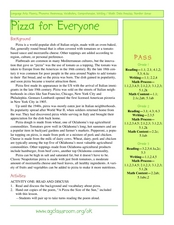Skyscraper Museum
Building a Skyscraper
The construction of skyscrapers is no simple undertaking, involving the careful coordination and planning of many different people. The third lesson in this series explores this detailed process by first teaching children about the main...
Skyscraper Museum
Building a Skyscraper
Creating buildings that reach hundreds of feet into the sky is no easy task. The third instructional activity in this series begins with four activities that engage young architects in exploring the major challenges that are faced when...
Skyscraper Museum
Designing a Skyscraper
Besides serving as awe-inspiring monuments of human achievement, skyscrapers are built to perform a wide range of functions in urban communities. The second lesson in this series begins by exploring the history of the Empire State...
Skyscraper Museum
What is a Skyscraper?
Skyscrapers are amazing feats of architectural design that create the iconic skylines of the world's biggest cities. Young architects explore the defining characteristics of these monstrous towers with the first instructional activity in...
Poston Butte High School
Literacy Language Kit for the Book Hi! Fly Guy
Create a buzz in your class with this collection of learning activities for the book Hi! Fly Guy. Including a list of comprehension questions, a sequence of events activity, a summary writing assignment, and a vocabulary list, this...
Curated OER
Poems: calligrams
Have fun with shape poems! First and second graders write calligrams that add to the meaning of their poems. Great for your poetry unit or if you want to combine poetry and art lessons.
Curated OER
Lesson 3: Idioms
You're as cute as a bug. But are you really as cute as a bug? Bugs aren't cute! Idioms are fun nonliteral phrases that mean something different than the words they contain. Second graders learn about idioms as they read the book, More...
Curated OER
Writing About Talking
The story of King Arthur is a fascinating one, and this retold excerpt offers an excellent example of narrative word choice in a dialogue. Learners read the text and examine the way the author uses synonyms for said. They write down...
Curated OER
Shades of Meaning
Examine and distinguish between words that have similar definitions but different connotations. Middle schoolers define connotation and denotation and participate in a "shades of meaning" contest in small groups. Groups use the...
Curated OER
Poems
Thud! Squiff! Create sound effects with words. Introduce your youngsters to onomatopoeia with these fun, rainy-day poems. They write down sound words, discussing rhythm and rhyme. You can also incorporate the author's use of capital...
Curated OER
Synonyms
Help keep your writers from using the same words in their writing: introduce them to synonym. Learners read a brief explanation of synonyms with examples. Then, they fill in a chart by writing synonyms for six adjectives. Consider having...
Curated OER
Homographs
There are eight homograph riddles here: can your scholars figure them out? For each, there are three definitions and a picture. Learners use the picture and multiple meanings as clues, recording a word that matches all three. They read...
Curated OER
Using Compare and Contrast Key Words
Compare and contrast while challenging your class with this higher-level thinking and reading comprehension lesson. After observing the teacher model comparing and contrasting bats and birds, learners read passages about two towns. They...
Magic Light Pictures
Room on the Broom Word Scramble
Develop young readers' spelling and vocabulary skills with a simple word scramble worksheet. Complementing a reading of the children's book Room on the Broom by Julia Donaldson, this resource helps to reinforce learners'...
Curated OER
Bee Pollen Popular
The world would be a much different place without the help of pollinators. Read about the important role bats, hummingbirds, and various insects play in plant reproduction, exploring the interdependence of living things in an ecosystem....
Random House
Recipe for an Ecosystem
Creating an ecosystem is as simple as baking a cake. Well, maybe not, but using a recipe analogy helps learners realize that ecosystems consist of different components that come together in unique ways. Offer this learning exercise as an...
Curated OER
No Foot, No Horse
Why do horses wear shoes? Why do people wear shoes? Using worksheets, which are embedded in the plan, learners write descriptive paragraphs about their own shoes, classify a pile of shoes, and also engage in math games about the variety...
Curated OER
Language Play
Introduce your scholars to onomatopoeia and alliteration using a language elements activity. They examine six sound words and match them to four pictures. Next, learners read two examples of alliteration and write one of their own. They...
Growing Minds
Lettuce Exploration
Kathy Henderson’s book And the Good Brown Earth introduces the class to how a vegetables grows and changes over time. They use different types of lettuce to do a close study of this quick-growing vegetable. Learners consider the look,...
Curated OER
Cause and Effect Relationships
Cause and effect relationships can be found in life and in literature. Enthusiastic readers will find and discuss all of the cause and effect relationships in the story, Alexander and the Terrible, Horrible, No Good, Very Bad...
Curated OER
Distinguish Fact from Opinion in Passage
Is it a fact or is it an opinion; readers need to know. Second graders learn a new technique to determine if a sentence or reading passage is fact based or opinion based. They read and then ask evidence based questions to determine if...
Curated OER
Oklahoma's Berry Best
Ask your learners to complete activities related to Oklahoma's agriculture, berries in particular. The instructional activity is cross-curricular and has class members investigate an article about berries, write an acrostic poem, and...
Curated OER
Pizza for Everyone
Pizza is the inspiration for the cross-curricular lesson detailed here. Start out with a poem about pizza and move into a discussion about balanced eating. To close the language arts portion of the lesson, ask your pupils to write...
Curated OER
Oklahoma Stone Soup
Class members complete activities related to the story "Oklahoma Stone Soup." First, pupils read, discuss, and answer questions about the story. Next, to incorporate math into the lesson plan, learners make stone soup using a variety of...























